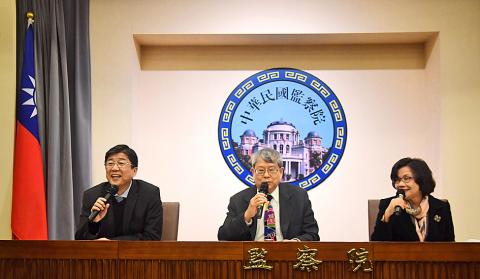The Control Yuan yesterday voted seven to four to impeach National Taiwan University (NTU) president Kuan Chung-ming (管中閔) for allegedly breaching the Civil Servant Work Act (公務員服務法) by writing opinion pieces for the Chinese-language Next Magazine (壹週刊) while serving as minister without portfolio.
Control Yuan members Chen Shih-meng (陳師孟), Tien Chiu-chin (田秋堇), Fang Wan-fu (方萬富), Lin Sheng-fong (林盛豐), Walis Perin, Peter Chang (張武修) and Yang Fang-wan (楊芳婉) voted for the impeachment, while members Wang Mei-yu (王美玉), Liu Te-hsun (劉德勳), Chang Jen-hsiang (章仁香) and Chiang Ming-tsang (江明蒼) voted against it.
An investigation into Kuan’s allegedly illegal work was launched by Control Yuan members Wang Yu-ling (王幼玲) and Tsai Chung-yi (蔡崇義) in April last year.

Photo: CNA
The case is to be forwarded to the Public Functionary Disciplinary Sanction Commission.
According to a statement that Next Magazine submitted to the Control Yuan, while Kuan was a professor at NTU, he made a verbal agreement with the magazine that he would write opinion pieces in return for NT$50,000 (US$1,622) per month or NT$650,000 per year, Wang Yu-ling said yesterday at a news conference in Taipei, adding that the payments totaled NT$650,000 per year, because Kuan received an additional NT$25,000 every six months.
However, Kuan’s relationship with Next Magazine continued from 2010 to 2016, which was after his invitation to join the Cabinet as minister without portfolio, she said.
Kuan continued to regularly submit opinion pieces to the magazine anonymously while serving in the Cabinet from February 2012 to February 2015, during which time he was paid NT$1.9 million, she said.
By doing so, he breached Article 14 of the act, which prohibits civil servants from taking on outside work, she said.
Civil servants are allowed to submit articles to publications, but they can only do so occasionally, Tsai said.
Kuan said in a document submitted to the Control Yuan that he only wrote for Next Magazine at the magazine’s invitation and that he had never held any position at the magazine.
The Ministry of Civil Service in 2010 ruled that providing the media with information related to a position was only legal for a civil servant when the work was unpaid, Wang Yu-ling said.
Asked to comment yesterday, Kuan said that he would explain his position after reading the Control Yuan’s decision, adding that he had not yet been officially notified.
He said he would consult with his lawyers and confirm if they had submitted his statement to the Control Yuan.
Meanwhile, Minister of Education Pan Wen-chung (潘文忠) said the ministry respects the Control Yuan’s decision.
“The case is in a preliminary stage and the ministry will not act on it until the decision passes a second review at the Public Functionary Disciplinary Sanction Commission,” he said.
Additional reporting by Ann Maxon, staff reporter

DAREDEVIL: Honnold said it had always been a dream of his to climb Taipei 101, while a Netflix producer said the skyscraper was ‘a real icon of this country’ US climber Alex Honnold yesterday took on Taiwan’s tallest building, becoming the first person to scale Taipei 101 without a rope, harness or safety net. Hundreds of spectators gathered at the base of the 101-story skyscraper to watch Honnold, 40, embark on his daredevil feat, which was also broadcast live on Netflix. Dressed in a red T-shirt and yellow custom-made climbing shoes, Honnold swiftly moved up the southeast face of the glass and steel building. At one point, he stepped onto a platform midway up to wave down at fans and onlookers who were taking photos. People watching from inside

A Vietnamese migrant worker yesterday won NT$12 million (US$379,627) on a Lunar New Year scratch card in Kaohsiung as part of Taiwan Lottery Co’s (台灣彩券) “NT$12 Million Grand Fortune” (1200萬大吉利) game. The man was the first top-prize winner of the new game launched on Jan. 6 to mark the Lunar New Year. Three Vietnamese migrant workers visited a Taiwan Lottery shop on Xinyue Street in Kaohsiung’s Gangshan District (崗山), a store representative said. The player bought multiple tickets and, after winning nothing, held the final lottery ticket in one hand and rubbed the store’s statue of the Maitreya Buddha’s belly with the other,

Japan’s strategic alliance with the US would collapse if Tokyo were to turn away from a conflict in Taiwan, Japanese Prime Minister Sanae Takaichi said yesterday, but distanced herself from previous comments that suggested a possible military response in such an event. Takaichi expressed her latest views on a nationally broadcast TV program late on Monday, where an opposition party leader criticized her for igniting tensions with China with the earlier remarks. Ties between Japan and China have sunk to the worst level in years after Takaichi said in November that a hypothetical Chinese attack on Taiwan could bring about a Japanese

‘COMMITTED TO DETERRENCE’: Washington would stand by its allies, but it can only help as much as countries help themselves, Raymond Greene said The US is committed to deterrence in the first island chain, but it should not bear the burden alone, as “freedom is not free,” American Institute in Taiwan Director Raymond Greene said in a speech at the Institute for National Defense and Security Research’s “Strengthening Resilience: Defense as the Engine of Development” seminar in Taipei yesterday. In the speech, titled “Investing Together and a Secure and Prosperous Future,” Greene highlighted the contributions of US President Donald Trump’s administration to Taiwan’s defense efforts, including the establishment of supply chains for drones and autonomous systems, offers of security assistance and the expansion of